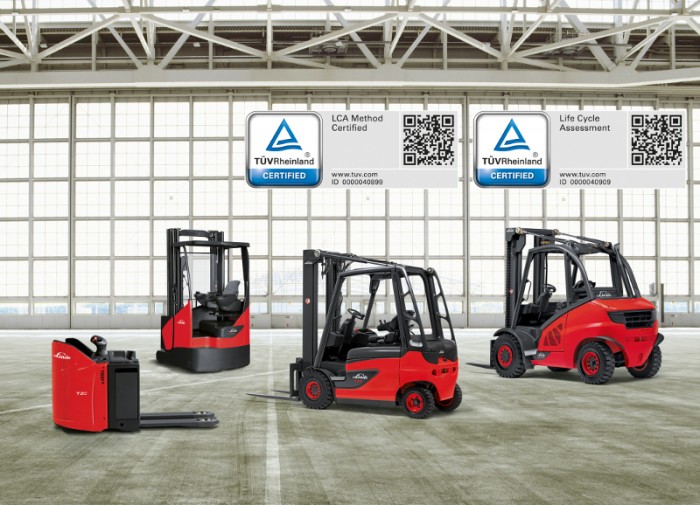Linde MH developed new life cycle assessments for environmental impacts of its equipments

Linde Material Handling has developed a scientific methodology with which to comprehensively assess the environmental impact of its forklift trucks and warehouse handling equipment over their entire product life cycle. Based on this, life cycle assessments (LCAs) have been undertaken for the company’s seven major product groups. Both the methodology and the resulting LCAs have been approved and certified by the technical inspection authority TÜV Rheinland.
Photo by Linde Material Handling GmbH
Together with the Fraunhofer Institute for Building Physics (IBP), Linde Material Handling has developed a scientific methodology with which to comprehensively assess the environmental impact of its forklift trucks and warehouse handling equipment over their entire product life cycle. Based on this, life cycle assessments (LCAs) have been undertaken for the company’s seven major product groups. Both the methodology and the resulting LCAs have been approved and certified by the technical inspection authority TÜV Rheinland. Dr. Jörg Schlösser, Managing Director of TÜV Rheinland LGA Products GmbH, today officially presented the TÜV certificates to Theodor Maurer, CEO of Linde Material Handling, on the occasion of the company’s World of Material Handling customer event in Mainz.
“With every new product line, we strive to improve the economic and environmental sustainability of our products,” Maurer pointed out upon receiving the certificates. “Now we have a tool at hand that helps us to pursue this goal even more efficiently and in a more targeted manner and what’s more, it has been examined by an independent institute. Furthermore, with these LCAs we can show our customers how the use of our vehicles affects their own environmental assessment.” As Dr. Schlösser emphasized: “In today’s world companies should always consider the environmental impact of their behaviour. Therefore, it is commendable that Linde Material Handling is not only aware of their responsibility for sustainability but also aims to make their numerous measures transparent by an impartial and independent certification.”
Holistic assessment approach
Based on life cycle engineering according to ISO 14040 and 14044, it is now possible to record and evaluate the environmental impact of the product groups of internal combustion engine counterbalance trucks, electrically driven counterbalance trucks, reach trucks, pallet trucks and pallet stackers as well as order picking equipment and tow trucks. The methodological approach of Linde Material Handling is comprehensive for two reasons: Firstly, it focusses on the holistic assessment of the vehicles’ life cycle – starting with raw material extraction and looking into the manufacture of every individual part, continuing with the transport and utilization phase including maintenance, and concluding with the recyclability of vehicle components. Moreover, Linde Material Handling considers not only CO2 emissions, but rather all environmental aspects such as ozone formation, water pollution, soil acidification, primary energy consumption and greenhouse effect in its analyses.
Life Cycle Assessment as control instrument
The Life Cycle Engineering Department of the Fraunhofer IBP supports the sustainability assessment at Linde MH, for instance with a software and database system with which complex system models can be visualised and evaluated on a scientifically sound basis. The aim is to take the findings of the LCA into consideration in the design and development processes in order to implement specific objectives for the next generation of vehicles. Moreover, the environmental impact of technical changes, such as the use of lithium-ion batteries, can be simulated and tested. The TÜV-certified method also enables life cycle assessments for other product groups, special configurations and individual products to be carried out at any time to meet specific customer requirements, for example.
“Even though a significant part of the environmental impact arises during utilization, life cycle engineering provides valuable information on how to make our production processes even more energy efficient and resource-conserving,” said Dr. Holger Hoppe, in charge of Sustainability Management at Linde Material Handling. In conclusion, Dr. Ralf Dingeldein, Head of the New Vehicles Division, pointed out: “We want to play a leading role not only in the efficiency of our vehicles. Sustainability issues such as workplace safety, environmentally compatible production and healthy working conditions play an important role for us too.”
For more information, please visit http://www.linde-mh.com.
News Categories
- » NEWS HOME
- » Automation & Robotics
- » Industry 4.0
- » Material Handling
- » Sensors
- » Quality & Testing
- » Machine Vision
- » Laser & Optics
- » Metalworking
- » Motion Control & Drives
- » Hydraulics & Pneumatics
- » Process Industry
- » Renewable Energy
- » Agriculture
- » Home & Office Furniture
- » Environmental Tech



